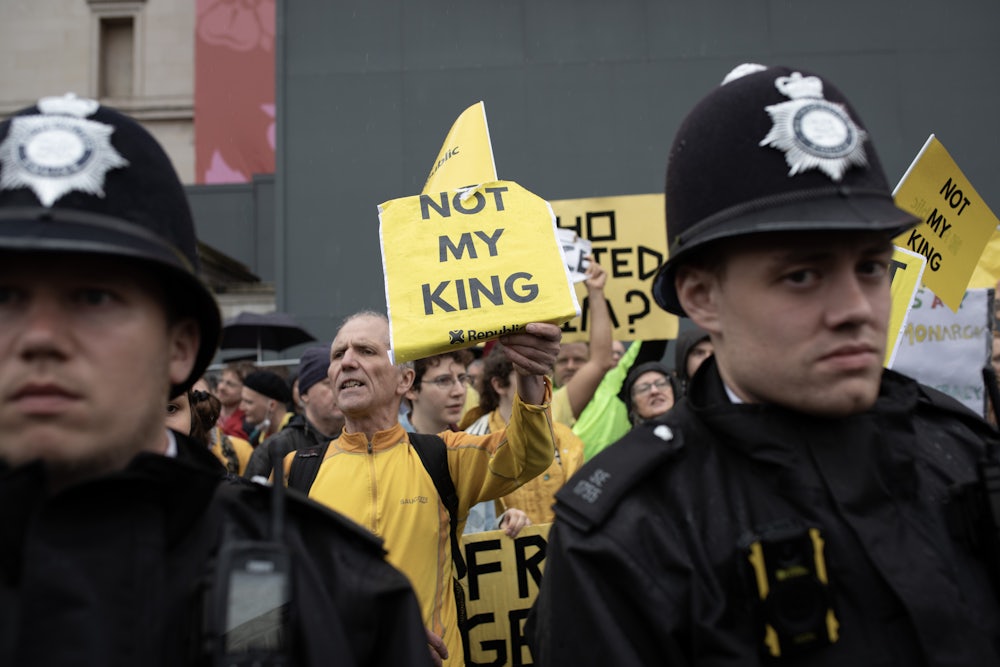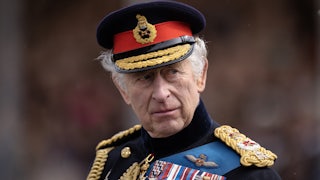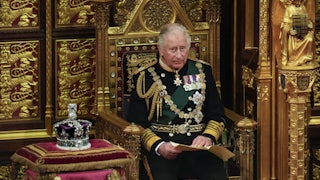Great Britain has a monarchic tradition and a free speech tradition. Defenders of Britain’s constitutional monarchy argue that it’s sufficiently harmless as to pose no real threat to freedom of expression. But when the two came into conflict at King Charles III’s coronation last weekend, free speech gave way, demonstrating that England’s quaint royal tradition isn’t half so benign as advertised.
“I have been told many times the monarch is there to defend our freedoms,” tweeted Graham Smith early Sunday. Smith is chief executive of Republic, a protest group that seeks to abolish Britain’s monarchy. “Now,” Smith continued, “our freedoms are under attack in its name.” Smith was one of 52 protesters arrested by the London Metropolitan Police in advance of the king’s procession by gilded horse-drawn coach from Buckingham Palace to Westminster Abbey.
Smith’s group received advance police permission to hold a rally in Trafalgar Square, which is situated along a bend in the parade route and is the traditional site of protest in London. “We will be loud, visible, and unmissable,” Smith promised on April 15, adding, “we fully expect the police to live up to their assurances that the protest will be allowed to carry on.” But at 7:30 a.m. on Saturday—before the protest even started, and nearly three hours before the royal procession began—Smith was picked up along with five other Republic organizers and detained nearly 16 hours. The police also seized hundreds of placards lettered “NOT MY KING” and arrested the 46 others.
Not all those arrested were planning to participate in Republic’s anti-monarchy protest. Eighteen were with a group called Animal Rising, 14 were with a group called Just Stop Oil, and nine were not known to be part of any group. The latter two groups (unlike Republic) have a history of law-breaking. Animal Rising occupies racetracks to prevent horse races. There are laws against that (though with seven horses dead in the run-up to the Kentucky Derby, I find it harder to refute this moral challenge). Just Stop Oil are those jerks who try to curb greenhouse emissions by vandalizing works of art, which is obviously illegal (and also politically stupid, because it pisses off the group’s natural allies among the cultural elite).
Perhaps, in coming days, we’ll learn that Animal Rising and Just Stop Oil were planning to do something tangibly illegal in relation to Charles’s coronation. We haven’t so far, though. Just Stop Oil stated that “no disruptive action was planned,” Animal Rising similarly said it had “no plans to disrupt the coronation,” and we have yet to see any evidence to the contrary. Indeed, the only suggestion thus far that anybody planned to disrupt the royal procession is that three people were arrested (and later released on bail) for carrying noisy “rape alarms” that police believe were intended to frighten the horses. Perhaps the accusation is true. If it isn’t, though, let me extend my congratulations to whichever public relations genius conceived this appeal to the traditionally English preference for equine beings over human ones.
Of the 52 who were jailed, the Metropolitan Police said, 32 were picked up “on suspicion of conspiracy to cause a public nuisance,” including, according to The Independent’s Lizzie Deardon, all six of the Republic protesters, five protesters from Just Stop Oil, and 14 protesters from Animal Rising.
The common-law concept of creating a public nuisance was developed back in the twelfth century to prevent the blockage of waterways. An analogy might therefore be drawn to interrupting a royal procession. (Though God knows we all need water transportation far more than we need kings.) But interrupting the coronation parade is something all three groups said they weren’t going to do. The common-law prohibition against creating a public nuisance was never intended to inhibit speech—for instance, waving a sign that says “NOT MY KING” or wearing a T-shirt that says “JUST STOP OIL.” Just Stop Oil says 20 of its supporters were arrested for doing no more than that.
England’s legal basis for busting protesters over conspiring to cause a public nuisance was created in 2022. In horrified response to Black Lives Matter and other street protests, the Tory government expanded police powers to shut down demonstrations. Where previously police had to show that failing to arrest a demonstrator might result in “serious public disorder, serious damage to property, or serious disruption to the life of the community,” under the new law it was sufficient to show that said demonstrator was “intentionally or recklessly causing public nuisance” (italics mine). This was sold as a “simplification” of criminal law, but it was really a law that made it easier to suppress free speech.
The Tory Parliament judged even that change insufficient to quell protests during Charles’s coronation. (What’s the point of being a Tory if you don’t pamper the king?) So, less than a week before the gaudy royal celebration, it passed another law expanding police powers against public protests still further. The Public Order Act permits police (according to a government fact sheet) “to proactively tackle highly disruptive protesters intent on committing an offence by searching for and seizing items which are made, adapted, or intended to be used in connection with protest related offences.”
Like, perhaps, Graham Smith’s “NOT MY KING” protest signs and those 20 “JUST STOP OIL” T-shirts (though we don’t know for certain that the London bobbies in question were relying on this new protocol).
The main target, though, of last week’s Public Order Act was the newly outlawed practice of “locking on,” wherein protesters attach themselves “to others, objects, or buildings.” You can now be imprisoned for up to six months in Britain just for doing that. The Guardian reported that the Metropolitan Police claimed the Republic protesters were carrying lock-on devices. The group said they were not. But suppose they were. Would that be something to throw someone in jail for?
When the British government concludes that protecting free speech and freedom of assembly must yield to maintaining a constitutional monarchy, that’s a powerful signal that the innocent Disneyland image of fairy-tale kings and queens and princes and princesses is a fraud. We knew already, from the testimony of Princess Di and her son Harry and the conjectures of The Crown (perhaps half of them true), that monarchism takes an inhumane toll on its participants. The coronation crackdown shows that it’s also taking a toll on ordinary Britons. Given the choice between free speech and royal prerogatives, no sane person living outside of Britain would side with the gilded coach. Perhaps the events of last weekend will bring a majority within Britain finally to agree.






